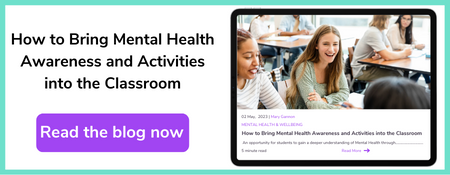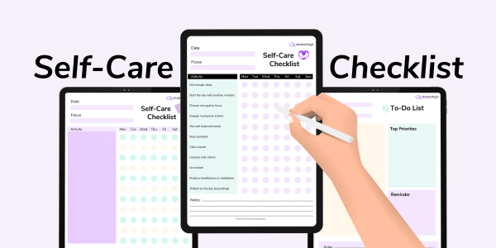10 Tips to Take Care of Yourself [ FREE Self-Care Checklist ]
by Tanvir Kaur on 23 Jun, 2023
In today's fast-paced world, it is crucial for us to prioritize both our physical and mental health. Incorporating self-care habits into daily life, not only ensures personal well-being but also helps establish a deeper connection with the inner self. Self-care involves dedicating time to activities that promote overall health and improve both physical and mental well-being. It enables us to effectively manage stress, reduce the risk of illness, and increase energy levels. Even small acts of self-care can have a significant impact on one's life.
Understanding Self-Care
"The World Health Organization (WHO) defines self-care as the ability of individuals, families, and communities to promote health, prevent diseases, maintain well-being, and cope with illness and disability, both with or without the support of healthcare providers." By adopting self-care practices, individuals can connect with themselves, take control of their health, improve their quality of life, and reduce anxiety.
Engaging in a self-care routine has been clinically proven to aid in reducing or eliminating anxiety and depression, managing stress, improving concentration, minimizing frustration and anger, increasing happiness, boosting energy levels, and more. Moreover, from a physical health standpoint, self-care has been shown to reduce the risk of heart disease, stroke, and cancer.
To further understand the significance of self-care, resources such as TED Talks can provide valuable insights. TED Talks offers a curated playlist titled "The Importance of Self-Care", which delves into the topic and offers diverse perspectives.
Self-Care Tips
Discover these 10 self-care tips that you and your students can integrate into your daily routines to promote positive physical and mental health. Remember, self-care is a personal journey, and it's crucial to find activities that resonate with your needs and bring you joy. Experiment with these tips to determine which ones work best for you.
- Regular Exercise: Engaging in regular physical activity offers numerous advantages, including improved mood and enhanced physical health. These benefits, in turn, have a positive impact on mental well-being.
- Adopt Healthy Eating Habits and Stay Hydrated: Maintaining a well-balanced diet and ensuring proper hydration throughout the day can significantly boost energy levels and enhance focus.
- Give Priority to Quality Sleep: Developing a consistent sleep schedule and obtaining sufficient sleep each night is crucial. Establish a bedtime routine that promotes better sleep quality and allows you to wind down before bed.
- Slow Down: Reserve a specific time each day to engage in a relaxing activity that allows you to unwind and find inner calmness. Consider exploring relaxation or wellness programs and apps that incorporate practices like meditation, muscle relaxation techniques, or breathing exercises.
- Set Goals and Prioritize: Determine tasks that require immediate attention and practice saying "no" when you feel overwhelmed. Reflect on your accomplishments at the end of the day rather than focusing on what was left undone.
- Cultivate Gratitude: Develop a daily practice of expressing gratitude. Take time to identify specific things you are grateful for, either by writing them down or reflecting on them mentally.
- Embrace Positivity: Take control of negative self-talk by challenging your inner critic. Cultivating a positive mindset can greatly contribute to improved mental well-being.
- Practice self-compassion: Practice self-forgiveness when you make mistakes and embrace a compassionate attitude towards yourself.
- Try Journaling: Spend time writing in a journal to gain a deeper understanding of your emotions and their origins.
- Stay Connected: Express your thoughts and feelings and reach out to friends or family members who can offer emotional support and practical assistance during challenging times.
Mental Health Resources
In addition to these self-care practices, numerous online resources are available to support mental health and well-being. Governments, including the Government of Canada, have taken initiatives to promote positive mental health and provide resources for individuals seeking support.
ChatterHigh provides a wide range of mental health and well-being courses at both national and regional levels. Among the national courses offered are the Digital Mental Health Course for Students. These courses are specifically designed to raise awareness among students about mental health, well-being, and available resources across Canada. By incorporating these courses into the classroom, educators can create an interactive learning environment and promote awareness about mental health. For more information on regional mental health and well-being courses, check out our Resources page.
Conclusion
Prioritizing self-care is essential for maintaining both physical and mental health. By adopting self-care habits, individuals can enhance their overall well-being, manage stress, and reduce the risk of various health issues. We have developed a complimentary checklist to assist you and your students on your self-care journey. This checklist is a valuable resource that helps ensure the integration of self-care practices into your daily life.
Download the free Self-Care Checklist below ⬇️ This valuable resource not only offers a customizable checklist to cater to your individual preferences in self-care but also includes a helpful to-do list to help you stay organized. Don't forget to share these resources with your students to support their mental well-being.


.png?width=512&height=256&name=Digital%20Mental%20Health%20Course%20for%20Students%20(Canada).png)

